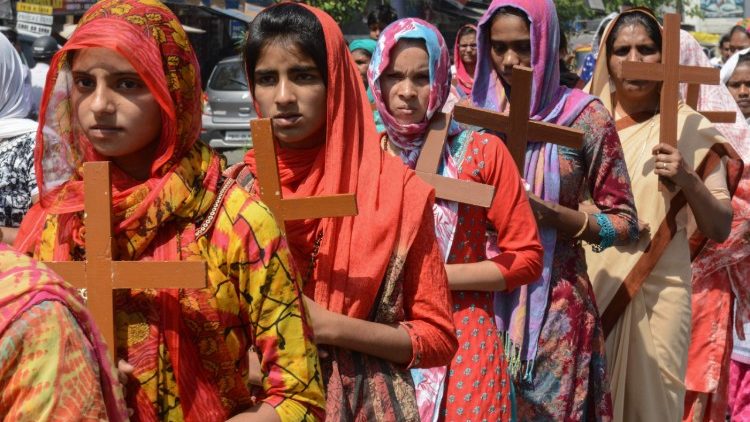Indian Church’s “Black Day” protest for Dalit Christians, Muslims
A 1950 Constitution Order grants benefits to Hindu, Sikh and Buddhist Dalits but discriminates against Christians and Muslims.
Aug 12, 2019

By Robin Gomes
India’s Catholic Church observed “Black Day” on Saturday, to protest against the discrimination that low-caste Christians and Muslims continue to face in the country.
Indian bishops want to remind the people that the country bears constitution-based discrimination against Dalit Christians, i.e. Dalits who embrace Christianity.
Who are Dalits?
Dalit which means "broken" or “downtrodden”, denotes former "untouchables" who are so low in social status that they were considered outcasts or outside the rigid caste system of Hindu society. The Indian Constitution reserves special privileges and benefits such as quota in government jobs and educational institutions for Dalits, scheduled tribes (ST), scheduled castes (SC) and backward classes (BC) to help their socio-economic uplift.
Dalits form the bulk (about two thirds) of India’s Christian community, that makes up 2.3 per cent of the country’s some 1.3 billion population.
Discrimination
The Constitution (Scheduled Caste) Order (Paragraph 3) that India’s first president Rajendra Prasad signed on August 10, 1950, initially stated that “…no person who professes a religion different from the Hindu religion shall be deemed to be a member of a Scheduled Caste.”
Dalit Christians and Muslims observe the Black Day protest on August 10, the anniversary of the signing of this discriminatory presidential order.
Subsequently, the Order was modified to include Sikhs (in 1956) and Buddhists (in 1990) after they protested but Muslims and Christians of low caste origin were excluded.
Dalit Christians and Muslims regard the presidential order and its amendments discriminatory and a violation of the Indian Constitution that upholds equality before the law and prohibits discrimination of any citizen on the ground of only religion, and guarantees freedom of conscience and freedom to profess any religion.
Christians united
First observed in 2009, Black Day is organized by the Catholic Bishops’ Conference of India (CBCI), the National Council of Churches in India and the National Council of Dalit Christians.
Black Day is observed in almost all Indian states, but especially in Maharashtra, Karnataka, Tamil Nadu, Odisha and Andhra Pradesh, says Fr. Vijay Kumar Nayak, the Secretary of the CBCI Office for Scheduled Castes/Backward Classes.
Speaking to Vatican News, he explained that on Black Day they bring together Christian Church officials, Dalit Christians and Muslims, politicians and other people of goodwill and hold meetings, demonstrations and rallies to protest against the discriminatory 1950 presidential order.
They hand memoranda to the Indian president, prime minister and other government officials.
Fr. Nayak noted that in 2004 they filed a petition in the Supreme Court of India on behalf of Dalit Muslims and Christians against the discrimination based on religion.
The priest is upbeat that the Supreme Court has given the order for the hearing to start in September. Fr. Nayak says they have the necessary documents in place but are looking out for a renowned advocate to fight their case.--Vatican News







Total Comments:0